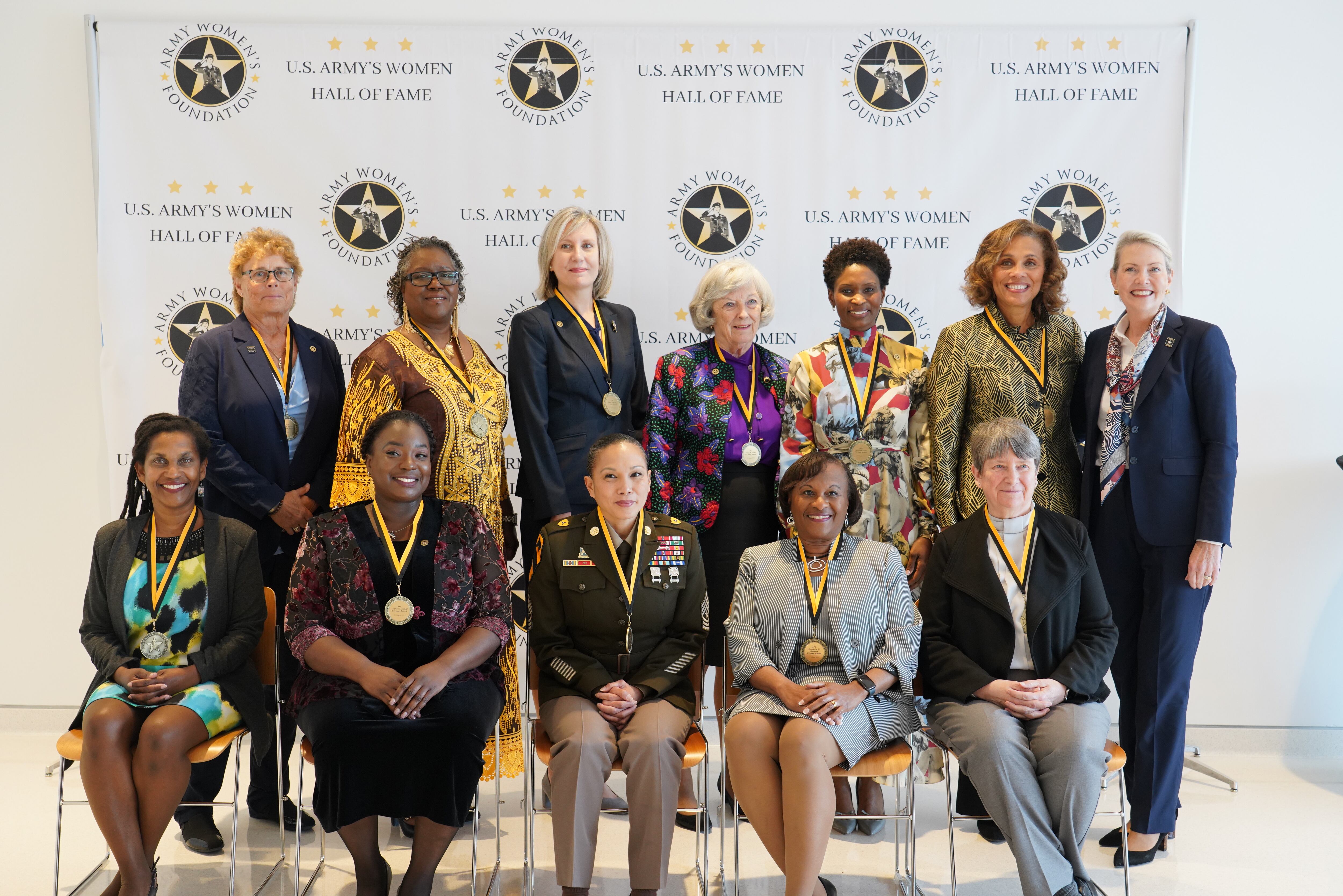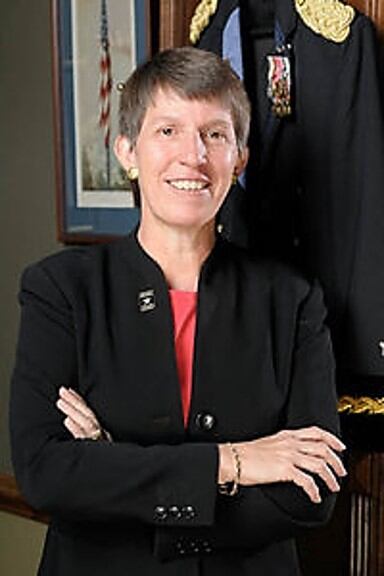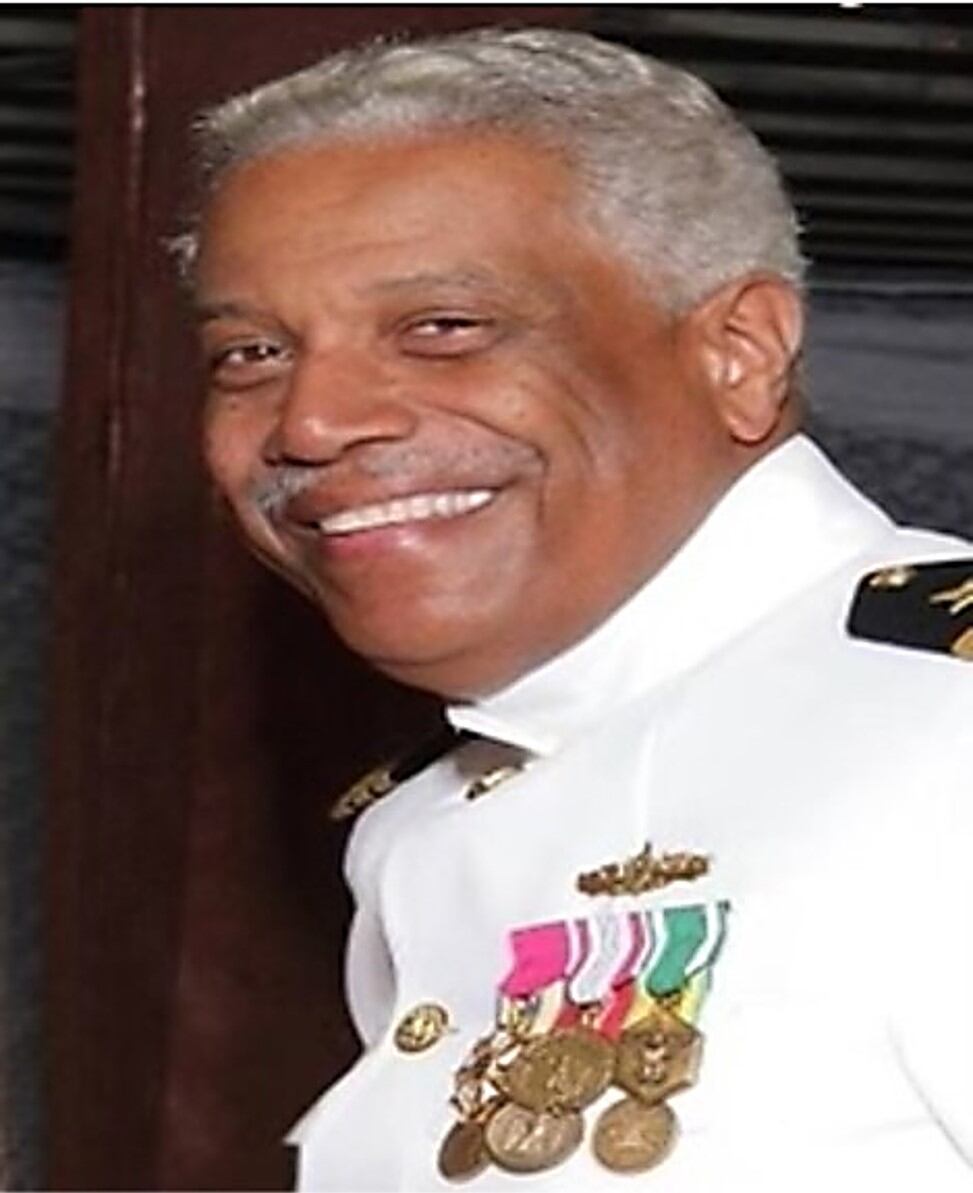The 2023 inductees to the Army Women’s Foundation Hall of Fame and separate awardees included three-star generals, a staff sergeant and even a male Navy commander.
Some served as pioneers in their service, breaking barriers to education and jobs previously limited only to men. Others are still serving and making changes that benefit women, such as expanding ponytail wear from combat helmets to all uniforms.
The foundation, established in 1969, held its 15th annual induction ceremony at the National Museum of the United States Army at Fort Belvoir, Virginia on March 22.
This year’s his year’s ceremony honored the service, sacrifice and contributions of female Army servicemembers and veterans and those who have served and those whose work has made a difference in the lives of female soldiers. The foundation selected eight individuals for recognition.
“We’re a small group, but it’s moments such as these, this ceremony is so uplifting and it’s so great to be able to recognize women who’ve done extraordinary things,” said retired Army Brig. Gen. Anne F. Macdonald, who now serves as foundation president.
RELATED

Macdonald told Army Times that this year’s event featured the inaugural scholarship awarded in honor of the 6888th Central Post Directory Battalion, the Army’s first and only all-Black female unit to be deployed overseas during World War II.
The foundation has awarded more than $600,000 in scholarships over the past 14 years, Macdonald said.
Retired Chief Warrant Officer 4 Nicole Burkett received this $2,500 scholarship in part for her current doctoral research on the effects of combat service on Black female veterans.
Burkett joined the Army in 1995 primarily to help pay for college but wound up serving until her retirement in 2019. The supply chain logistics expert deployed to Kuwait, Korea and Afghanistan and held down the home front when her fellow soldier husband deployed to Iraq.
“It means a lot to me to win this award,” Burkett told Army Times.
The funding will help her continue research on an underserved population. She’s conducting interviews with black female combat veterans in her home state of Texas as she completes her dissertation.
“I think the foundation is extremely important,” she said.
The organization provides “situational awareness,” she said and ensures that women have a voice on Army concerns.
Below are brief biographical notes on each of the inductees and awardees from this year’s ceremony:
Retired Army Col. M. Tia Johnson
Johnson notched many firsts during her three-decade Army career. Those included serving as the first Black woman to be promoted to the rank of colonel in the 227-year history of the U.S. Army Judge Advocate General’s Corps. Also, she served as the first female chief over operational law to an Army corps, advising war planners and warfighters, and the first Black woman to chair an academic department at the U.S. Army Judge Advocate Generals’ School. On January 3, 2023, the Honorable M. Tia Johnson was sworn in as a judge for the military’s top court, the U.S. Court of Appeals for the Armed Forces. The military court consists of five civilian judges, each appointed to 15-year terms. Johnson is the first Black woman to serve on the court.

Retired Army Lt. Gen. Flora D. Darpino
Combat veteran Darpino broke numerous gender barriers throughout her career. She is the first and highest-ranking woman appointed as the Judge Advocate General of the United States Army since the establishment of the Army in 1775. As The Judge Advocate General of the U.S. Army, Darpino served as the senior military lawyer for the service and the principal legal adviser to the Secretary of the Army. She directed over 10,000 lawyers in the JAG Corps at more than 100 active and reserve Army legal offices across the United States and abroad. Her legacy lives on in the people she led and inspired.

Retired Army Lt. Gen. Susan S. Lawrence
Lawrence is an Army leader, mentor, and role model who broke multiple gender barriers throughout her over 39-year career as both an enlisted soldier and officer. She is one of the longest-serving members of the Women’s Army Corps. The first female soldier to serve as the service’s top and highest-ranking Signal Officer, Chief Information Officer/G6. Before that, Lawrence served as the first female Commanding General, 5th Signal Command, and the U.S. Army Europe and Seventh Army Chief Information Officer/ Assistant Chief of Staff, G-6. She continues to serve the military and veteran community as the first female president and CEO of Armed Forces Communications & Electronics Association International in the association’s 75-year history.

Retired Army Brig. Gen. Rebecca “Becky” S. Halstead
Halstead achieved many firsts during her 27-year career in the Army. The first female soldier to graduate from any of the service academies to then earn a promotion to flag rank; the first woman to command in combat at the strategic level; and the first woman Chief of Ordnance and Commandant of the U.S. Army Ordnance School. Then there are the ways in which she led and continues to lead. Halstead made extraordinary contributions to the Army and to soldiers and Army civilians. The retired general now serves as an inspirational speaker, caring leader and author of 24/7: The First Person You Must Lead Is YOU.

Retired Army Brig. Gen. Velma “Von” L. Richardson
Richardson is the second Black female general officer in the history of the Army and the first Black female officer to obtain the rank of brigadier general in the signal corps. At the time of her 2003 retirement, she served as the senior Black woman in the active-duty Army. Over her 31-year Army career, Richardson voiced strong advocacy for all soldiers, regardless of gender. Richardson has interests in mentorship, education, youth, and national security, and she belongs to organizations and serves on boards that feed those interests.

Retired Army Command Sgt. Maj. Debra L. Strickland
Army Combat Veteran, mentor, coach, and advocate CSM Debra Strickland achieved many firsts during her 36-year career. CSM Debra Strickland served as the first command sergeant major of the Installation Management Command in 2006; before that, she was the first woman command sergeant major of the Installation Management Agency in2002. As IMCOMS’s chief advocate for quality-of-life issues, she is credited for guiding and developing the First Sergeant’s Barracks Initiative. She culminated her career as the first female CSM and Base Camp Sergeant Major for Base Support Group Kabul, Afghanistan. CSM Strickland continues to focus on improving fellow veterans’ lives through the presentation and support of scholarships and corps regimental awards developed in memory of her husband, SGM Larry L. Strickland, who was killed in the attack on the Pentagon.

The foundation honored the following individuals in their Champion Award category:
Retired Navy Cmdr. Carlton D. Philpot
Philpot worked over three decades to recognize and honor the contributions, service, and sacrifices of Black military units and Army women who have served with courage, honor, and unselfish devotion. Due to his contributions, generations will know Cathay Williams – the only known Female Buffalo Soldier, Lt. Col. Charity Adams Earley, Lt. Col. Harriet Waddy, and the women of the 6888th Central Postal Directory Battalion.

Army Staff Sgt. Abby M. Davis
Davis championed on behalf of Army women the change to Army Regulation 670-1 to authorize female soldiers to wear ponytails in all uniforms. The Army released updated grooming and appearance regulations in 2021 after the regulation board convened specifically to consider the impact of AR 670-1 on minority soldiers. The board’s recommendation led to the Army granting women the option to wear a ponytail only while wearing an Army-issued helmet were the hair bun interfered with the proper use of the helmet. Through Davis’s grassroots approach to solving a problem faced by Army women, regardless of uniform, she facilitated an updated grooming regulation allowing women the option to wear a ponytail in all uniforms.

Todd South has written about crime, courts, government and the military for multiple publications since 2004 and was named a 2014 Pulitzer finalist for a co-written project on witness intimidation. Todd is a Marine veteran of the Iraq War.




